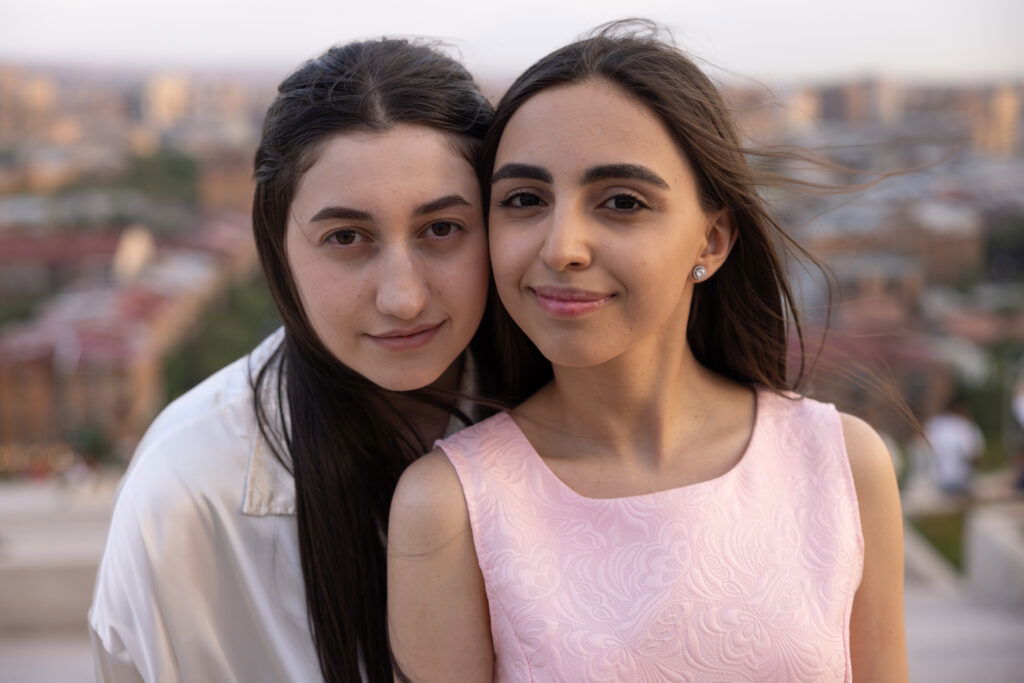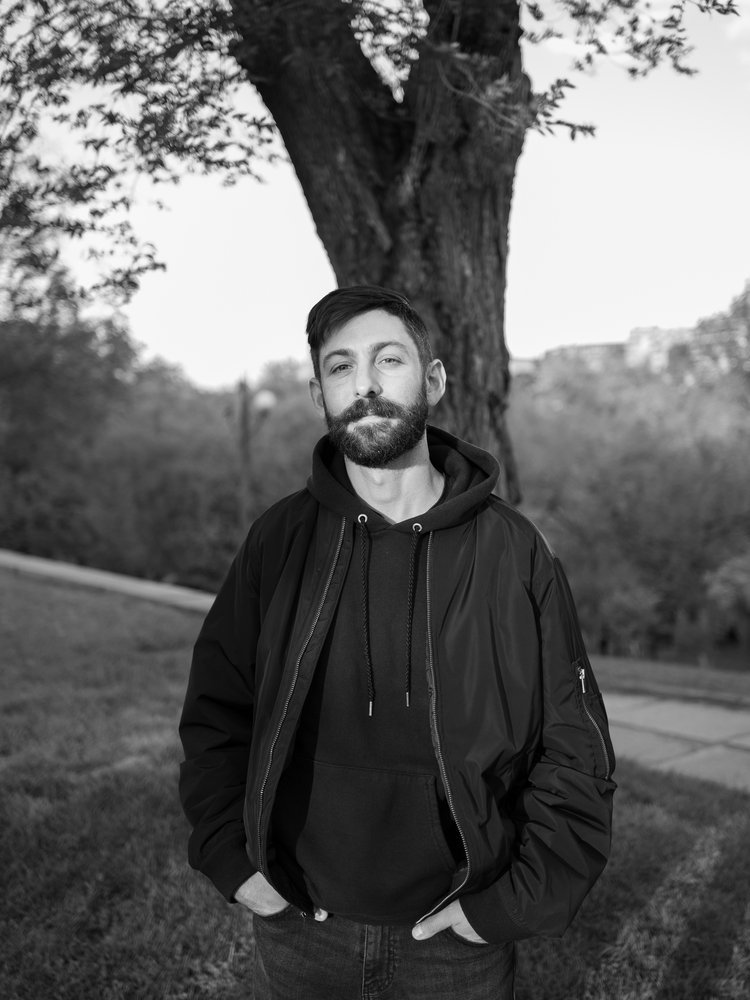
Seven months have passed since the start of the blockade of Artsakh (Nagorno Karabakh). Food, vital medicines and fuel supplies are scarce or unavailable, and hundreds of citizens wait in line each day to see what goods they can acquire. We have all heard the stories—the dire need for the international community to condemn Azerbaijan’s blockade of the only lifeline connecting Artsakh with Armenia, loved ones separated with no ability to return home and no end in sight. Earlier this month, I spent some time with two of several dozen students from Artsakh who are now essentially stranded in Yerevan after their studies ended.
Diana and Tatevik are medical students in their first year at Mkhitar Heratsi Yerevan Medical University. The blockade began during their studies, and they have not been able to return home since. They have not been able to see their friends, their family or their homes. Every day, they keep in touch with their families through phone and video calls, if lucky with the connection, witnessing their families’ pain and feeling helpless.
They share their personal stories with the Weekly.

Eighteen-year-old Tatevik Samvelyan is from Stepanakert. She originally considered going to school to become a translator. But after the 2020 Artsakh War, she came to the decision that the country needs more doctors and felt it was the obligation of every citizen to do something for their homeland.
“Last time I was at home everything was much different and much warmer”
The last time Tatevik spent at home was in October 2022 for her birthday. She says it was the most impressive birthday, because she didn’t think she would get the opportunity to travel home on that day. It was a surprise organized by her father who, along with her mother and younger brother, kept it a secret until the last minute. “It was such an emotional moment when I knew about it because I was worried that it would be my first birthday away from the family,” Tatevik says. One particularly memorable moment was a surprise photoshoot her parents organized, in which she took photos in the white coat of a doctor.
“I love my birthday a lot. And I don’t know why, but last time I was at home everything was much different and much warmer. And the day I was coming back to Yerevan I was so emotional,” recalls Tatevik, overcome with tears.

“On my birthday in 2020, I was in Gyumri, and obviously I wasn’t in the mood to celebrate anything. But my dad, who was still in Karabakh, was encouraging me to do something nice on that day. So I spent the day with my relatives, and on the same day in the evening I received a present—flowers and a stuffed animal—and I was told that it was from my dad although he was on the front,” recalls Tatevik.
While Tatevik has been in Yerevan, she has kept in contact with her father, although he’s not that talkative. She asks him about the current situation back home and tells him about her classes and how she spends her days to lighten the mood. As a military doctor, he also helps Tatevik with her lessons, and sometimes they prepare lessons together.
When the blockade started, Tatevik like many others thought that it would only last a short period of time and that the road would open soon; however, the more time that passed, she began to lose hope that it would ever open again.

“Other students are dreaming about going abroad for vacation—our dream is simply to go home”
Tatevik reiterates what hundreds of residents of Artsakh say on a daily basis—that they have a serious problem with food deliveries. However, she hopes that something will change “because it simply cannot remain in this status.” “After exams, other students in the group were discussing their vacation plans like going to the beach, Egypt and other countries. At that moment my friend and I (again from Artsakh), were just looking at each other because our dreams are so different. We simply dream of going home, to hug our parents and loved ones.”
While the citizens of Artsakh desperately wait for the road connecting to Armenia to open, Tatevik says that if there is a chance to go home she will do that, even knowing that it will be much harder to come back to Yerevan again.
“I think that we, the people of Artsakh, do not deserve what we’ve been going through. I was wondering why regular people can dream about going abroad for a vacation, but we are dreaming about simple things, like going home or having electricity or eating fruits and vegetables.”
When asked if she’s going to try to convince her family to move to Yerevan with the situation worsening in Artsakh, she replies, “I don’t want to think that one day I won’t live in Artsakh or something bad will happen to Artsakh. No, I don’t want to think about bad things. I would say the opposite. I want to go back home, instead of convincing them to move here. And I want to live in our pre-war Artsakh.”

Diana Arakelyan, 19, is from Lernavan in the Askeran region, not far from Stepanakert. She lived in a large house surrounded by gardens with her parents, grandparents, two sisters and her six-year-old brother David. Her older sister currently studies in Artsakh, while her younger sister came to Yerevan to pass her exams at the American University of Armenia and remains in Yerevan with Diana.
“Mom, you’re cutting out, change your location”
Diana says that the white coat of the doctor is a “completely different world” for her, and she was inspired by her grandmother when choosing a career in medicine. After the 2020 war, her desire to become a doctor “doubled and even tripled,” she says, because doctors are needed more than ever in Artsakh.
Like Tatevik, Diana was also planning to travel home after the end of the semester in January. When the blockade started, she thought it was something temporary. As it continues, her only contact with the family is through phone calls, rarely video calls, which are frequently interrupted due to the poor Internet connection. “Mom, you’re cutting out, change your location,” quotes Diana, the most frequently used sentence when talking to her mother.
While Diana is trapped in Yerevan far from her family, her parents sometimes joke by saying, “You are the one who is under blockade, not us, because you are the one who cannot come back home.”
“See, Din, I painted this heart for you”
David, Diana’s six-year-old brother, is the one she misses the most. “I miss my parents differently, but in the case of Davo, I can’t explain, it’s something special. He resembles me a lot, and we share a unique and close bond. I often joke that, you know mom, he is my son, not yours,” says Diana.
As her family recounted, during the first period of the blockade, David was upset with their mother for not buying him bananas, something he has always enjoyed eating. “When they told me that story, I couldn’t help myself and got emotional, because before the blockade we would

buy him literally whatever he wanted, and now as the stores are empty, there is nothing they can do. So I urge my mom, ‘Don’t keep him in Artsakh because he’s not used to the situation. Send him to me and I will take good care of him,’” says Diana.
She says that she always asks David how he spends the days in school and what new things he has learned. During one of Diana’s video calls, he showed her a heart that he had painted for her: “See, Din, I painted it for you.”
“He always asks when I’m coming back. I used to say, you know, I have classes here and I cannot come right now. And recently when I was talking to my mom and told her that I finally passed all the exams, he cheered up thinking that I can manage to go home now. ‘Din, you will come home, won’t you? I’m waiting for you.’ I was trying to change the subject because to be honest, I have no hope that I will manage to go home anytime soon.”
“I was dreaming of sitting outside at night and enjoying the lights of Stepanakert, but now there are no lights, neither can I go”
Diana says that she usually speaks with her father on Sundays and asks him about the agricultural work he does on their land. “Near our land, there is a spot from which there is a magnificent view of where Stepanakert, Shushi on the hill and Askeran on the other side can be seen, and it feels like you are embracing all of Karabakh. I used to tell my Dad that in the summer I would come back, we would celebrate many things, and he would make samovar tea for me. I was dreaming of sitting outside at night and enjoying the view and the lights of Stepanakert. But now neither can I go, nor can you see any lights in Stepanakert,” says Diana.
Diana believes that all of this is being done to break the Artsakh people, but Azerbaijan must understand that it’s not possible. “My grandparents always say that they have seen even worse days in 1992 and it couldn’t break them. They say that we will find the strength to go through this situation without food, without taking a shower, and without electricity, with one candle. The only important thing is that we live in peace, that our soldiers come back safe and healthy. The rest is not important; the rest we can handle,” Diana says. “I have so many thoughts in my mind, all kinds of scenarios are running through my head, but I’m trying to think that everything will be okay. I am trying to think that some solution will be found for this situation. I’m not sure what scenario will happen. What I am sure of is that this situation will come to an end as soon as they [Azeris] understand that they cannot break us and force us to leave our homes.”

Diana says that after the war in 2020, when they returned back to Karabakh, she was depressed and one of her only coping methods was to pray. “That is what helped me to find the strength to try to go back to the pre-war lifestyle. Although I cannot forget all the feelings I went through, I’m trying to pass that. But it’s impossible to forget that because it’s not over and we are now in kind of a ‘passive war,’” she says.
Towards the end of our conversation, I asked Diana about her plans and the plans of her family. “We have put aside all the plans we had made before. Everything has changed now, and our plans for the future have changed too. I will put it this way. People living there don’t even make plans. They live their days trying to enjoy every single moment and to appreciate that nothing bad happened on that day and their beloved ones are safe. And every morning each of us prays that nothing bad happens on that day,” she answers.




Thank you Anthony, Very Much!Heart Breaking Article.